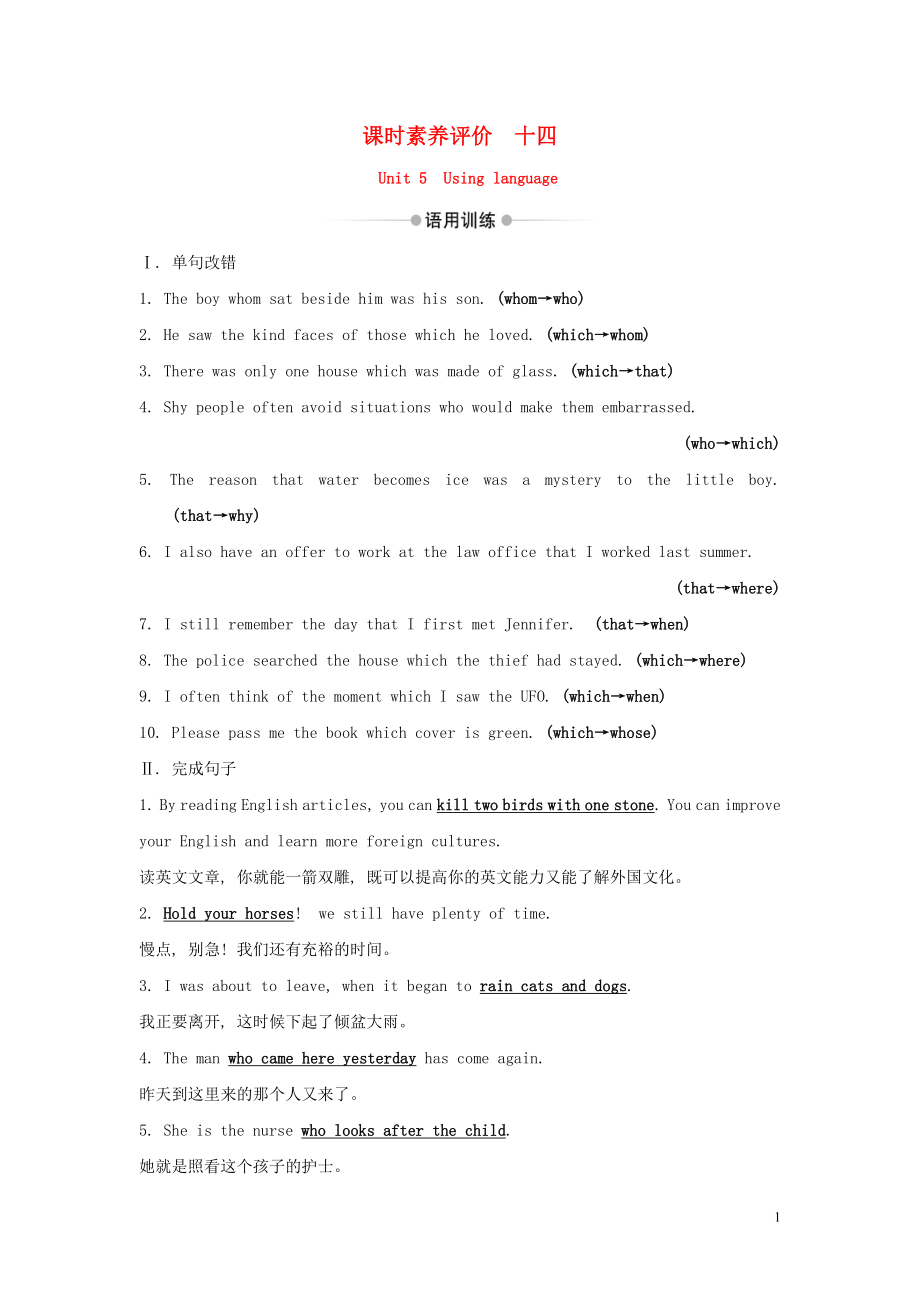《2020版新教材高中英語 課時素養(yǎng)評價 十四 Unit 5 Using language(含解析)外研版必修1》由會員分享�����,可在線閱讀,更多相關(guān)《2020版新教材高中英語 課時素養(yǎng)評價 十四 Unit 5 Using language(含解析)外研版必修1(6頁珍藏版)》請在裝配圖網(wǎng)上搜索����。
1��、課時素養(yǎng)評價 十四
Unit 5 Using language
Ⅰ. 單句改錯
1. The boy whom sat beside him was his son. (whom→who)
2. He saw the kind faces of those which he loved. (which→whom)
3. There was only one house which was made of glass. (which→that)
4. Shy people often avoid situations who would make them embarrass
2����、ed.
(who→which)
5. The reason that water becomes ice was a mystery to the little boy. (that→why)
6. I also have an offer to work at the law office that I worked last summer.
(that→where)
7. I still remember the day that I first met Jennifer. (that→when)
8. The police searched the house wh
3���、ich the thief had stayed. (which→where)
9. I often think of the moment which I saw the UFO. (which→when)
10. Please pass me the book which cover is green. (which→whose)
Ⅱ. 完成句子
1. By reading English articles, you can kill two birds with one stone. You can improve your English and learn more fore
4��、ign cultures. ?
讀英文文章, 你就能一箭雙雕, 既可以提高你的英文能力又能了解外國文化。
2. Hold your horses! we still have plenty of time. ?
慢點(diǎn), 別急! 我們還有充裕的時間��。
3. I was about to leave, when it began to rain cats and dogs. ?
我正要離開, 這時候下起了傾盆大雨�����。
4. The man who came here yesterday has come again. ?
昨天到這里來的那個人又來了�����。
5. She is the n
5、urse who looks after the child. ?
她就是照看這個孩子的護(hù)士��。
6. This is the very tool that we are looking for. ?
這就是我們正在找的工具�����。
7. I will never forget the days (that) we spent together there. 我永遠(yuǎn)不會忘了我們一起在那兒度過的那些日子。?
8. I saw a good film, which was about the Long March. ?
我看了一部關(guān)于長征的好電影�。
完形填空
While on a fa
6�、mily canoe trip on the Fox River a few years ago, Grant and Colton Shepard were disturbed by what they saw in the water. “We were there to enjoy the 1 , ”says Grant, “ 2 we saw a lot of litter(垃圾). ”?
The brothers, who live in Riverside, Illinois, went home and took action. They 3 the Illinois De
7���、partment of Natural Resources, 4 to monitor local rivers and streams carefully. They 5 training workshops to become familiar with the organisms(微生物)that are found in local 6 . ?
Ever since, the two boys have been taking weekly 7 from two rivers. They study them to make certain that the underwater
8����、ecosystem is 8 . Sometimes they find strange things. “We 9 discovered a big picnic table that had 10 underwater! ”says Grant. ?
It’s not just rivers that these kid volunteers 11 . They have devoted themselves to keeping their environment 12 balanced. “In the future, we’re going to need more resourc
9��、es. 13 we protect them now, they won’t be there for us, ”says Colton. ?
Every year, 14 their campaign for a cleaner world, the brothers 15 at least 100 days without using a car. Their purpose is to cut down on the 16 gases that cars give off into the air. ?
The brothers have also been active in
10����、helping 17 Illinois’ precious grassland. For the past two years, they have spent 18 one Saturday a month clearing away non-native plants from a 100-acre rare oak(橡木)grassland. “The plants and bushes 19 our heritage because they prevent the old oaks from growing 20 , ”says Grant. ?
【文章大意】保護(hù)環(huán)境, 需要從時時
11���、刻刻做起, 從遇到的每件事情做起。
1. A. garden B. grass C. beauty D. trip
【解析】選C����。邏輯推理題�。文章首句便指出一家人是在外出旅游, 故他們準(zhǔn)備欣賞的是美景(beauty)�。
2. A. because B. so
C. though D. but
【解析】選D。邏輯推理題�。“準(zhǔn)備欣賞美景”與“看到許多垃圾”之間為轉(zhuǎn)折關(guān)系, 故用but連接�����。
3. A. contacted B. reminded
C. informed D. interviewed
【解析】選A���。詞義辨析題。由句意及下文可知, 他們不僅將此事告知了自然資源部
12�����、, 而且還投身其中做了一些工作, 故用contact“聯(lián)系”����。
4. A. preparing B. offering
C. advising D. agreeing
【解析】選B���。邏輯推理題。由第三段他們的積極行動可知, 聯(lián)系到自然資源部后, 兩個男孩主動提出(offer)進(jìn)行監(jiān)控當(dāng)?shù)睾恿骱托∠墓ぷ鳌?
5. A. produced B. provided
C. attended D. held
【解析】選C�。詞義辨析題��。兩個小男孩一開始對水中的微生物并不是很了解, 因此他們參加(attend)了訓(xùn)練講習(xí)班進(jìn)行學(xué)習(xí)����。
6. A. forests B. lakes
C. wa
13���、ters D. schools
【解析】選C�。邏輯推理題�。由上文可知, 他們主動提出監(jiān)控當(dāng)?shù)氐暮恿骱托∠? 因此他們想熟悉的是當(dāng)?shù)厮蚶锏奈⑸? 用waters“水域”表達(dá)�����。
7. A. wastes B. samples
C. polluters D. liquids
【解析】選B����。邏輯推理題��。由常識可知, 對河流進(jìn)行監(jiān)控需要定期采集“水樣”進(jìn)行檢測, 故用samples���。waste“廢棄物, 垃圾”; polluter“污染物, 污染者”; liquid“液體”�。
8. A. in order B. in place
C. in danger D. in balance
14、【解析】選D����。詞義辨析題��。監(jiān)控并研究水樣當(dāng)然是為了保持當(dāng)?shù)厮律鷳B(tài)系統(tǒng)的平衡�。in balance“處于平衡狀態(tài)”; in order“井井有條”; in place“在適當(dāng)?shù)奈恢谩? in danger“在危險中”。
9. A. never B. often
C. once D. seldom
【解析】選C�����。邏輯推理題。此句是對上句“Sometimes they find strange things”進(jìn)行舉例說明���。由sometimes提示可知, 此處應(yīng)用once“曾經(jīng), 一次”。
10. A. put B. deserted
C. sunk D. left
【解析】選C
15����、��。邏輯推理題�����。由常識及underwater提示可知, 那張大野餐桌沉到水底, 故用sink。
11. A. pick out B. care about
C. look out D. take over
【解析】選B�。詞義辨析題。這些兒童志愿者所關(guān)心的不僅僅是河流��。care about“關(guān)心”; pick out“挑選出”; look out“向外看, 當(dāng)心”; take over“接管, 接收”。
12. A. slightly B. regularly
C. totally D. finally
【解析】選C��。邏輯推理題���。聯(lián)系上下文可知, 他們不僅僅是關(guān)心河流的生態(tài)環(huán)境, 他們
16�、更在意的是生態(tài)環(huán)境的整體平衡, 故用totally“完全地, 整個地”。
13. A. Even if B. As long as
C. Before D. Unless
【解析】選D���。邏輯推理題�����。由常識可知, 如果我們不保護(hù)自然資源, 這些資源就會被耗盡。unless“除非”, 相當(dāng)于if not�����。even if“即使”; as long as“只要”; before“在……之前”�����。
14. A. for the purpose of B. as a result of
C. as part of D. as well as
【解析】選C。詞義辨析題��。不開汽車是兄弟倆保護(hù)環(huán)境運(yùn)動
17�����、的一個組成部分, 故用as part of�����。for the purpose of“為了”; as a result of“由于”; as well as“也, 和”。
15. A. walk B. run
C. choose D. go
【解析】選D����。詞義辨析題��。go此處指“前進(jìn), 進(jìn)行”。
16. A. extra B. harmful
C. useless D. various
【解析】選B���。邏輯推理題。由常識可知, 汽車排到空氣中的氣體是“有害的”, 故用harmful����。extra“額外的”; useless“無用的”; various“各種各樣的”。
17. A.
18����、decorate B. plough
C. design D. restore
【解析】選D���。詞義辨析題。由句意可知, 他們還積極幫助復(fù)原伊利諾斯的寶貴草地, 故用restore��。decorate“裝飾”; plough“犁, 耕”; design“設(shè)計”����。
18. A. at least B. by turns
C. as usual D. at most
【解析】選A�����。詞義辨析題��。他們很積極地參與到這項工作中來, 因此每月至少用一個周六的時間前來工作。at least“至少”, 符合邏輯推理���。by turns“輪流”; as usual“和往常一樣”; at most“至多”。
19���、
19. A. destroy B. threaten
C. change D. replace
【解析】選B。邏輯推理題�����。由上句中clearing away non-native plants可知, 這些植物對本地的橡木草原不利���。threaten“威脅”, 符合情景。destroy“破壞”, 指導(dǎo)致的結(jié)果; change“改變”; replace“代替”�����。
20. A. rightly B. nicely
C. properly D. separately
【解析】選C��。邏輯推理題�����。because后解釋了這些植物如何威脅橡木草原——它們使橡木無法正常生長���。properly“適當(dāng)?shù)? 恰當(dāng)?shù)? 整整齊齊地”; rightly“端正地, 正當(dāng)?shù)? 正確地”; nicely“令人滿意地, 令人愉快地”; separately“分別地”���。
6
 2020版新教材高中英語 課時素養(yǎng)評價 十四 Unit 5 Using language(含解析)外研版必修1
2020版新教材高中英語 課時素養(yǎng)評價 十四 Unit 5 Using language(含解析)外研版必修1

